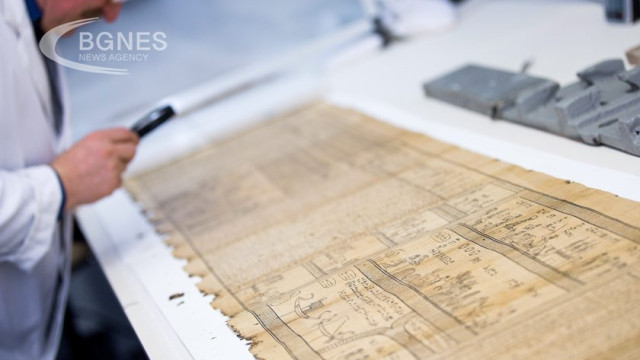Artificial intelligence has helped decipher an ancient papyrus scroll that turned into a piece of blackened carbon after the eruption of Mount Vesuvius in 79 AD. The first passages of the text reveal previously unseen reflections of a Greek philosopher.
The discovery won the $700,000 grand prize in the Vesuvius Challenge and used a combination of 3D mapping techniques and artificial intelligence to detect ink and decipher the letterforms in scroll segments known as the Herculaneum papyri that were scanned in digital form. The combined efforts of members of the winning team - Youssef Nader, Luc Faritor, and Julian Schilliger - could pave the way for further discoveries of additional papyrus scrolls that once resided in a library in the ancient Roman city of Herculaneum, New Scientist reported.
"I think it will be a huge gain to our knowledge of ancient philosophy, just gigantic - a staggering amount of new text," said Michael MacOskar of University College London, who was not involved in the discovery.
The winning project met the "Vesuvius Challenge" criteria - to read more than 85% of the symbols in four passages, each consisting of 140 symbols - and as a bonus included 11 more columns of text with a total of more than 2000 symbols.
These newly discovered Greek letters reveal the thoughts of Philodemus, who is believed to have been the philosopher who resided in the library that housed the Herculaneum papyri. The deciphered text focuses on how the scarcity or abundance of food and other goods affects the pleasure they provide. This corresponds to Philodemus' Epicurean school of philosophy, which places pleasure as the primary goal in life. It seems that his 2,000-year-old writing may even be poking fun at the Stoic school of philosophy, which has "nothing to say about pleasure."
The Vesuvius Challenge is not over. Its goals for 2024 include finding a way to scale up 3D scanning and digital analysis techniques without becoming too expensive. Current techniques cost $100 per square centimeter, meaning a virtual rollout of an entire scroll could cost between $1 million and $5 million, and 800 scrolls are waiting to be read.
"Realistically, most of the known, already extensive library is Epicurean philosophy, and that is what we should expect, but there are also important Stoic texts, perhaps some history and Latin literature. The complete texts of authors such as Ennius or Livius Andronicus, early Roman authors whose works have not survived would be wonderful," says MacOskar.
"The Epicurus symposium, in which he writes about the biology of wine consumption, would be very entertaining," he added./BGNES







